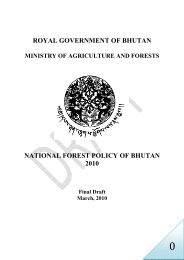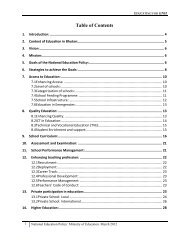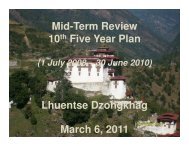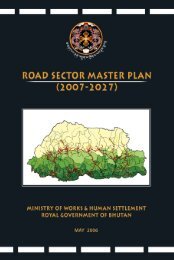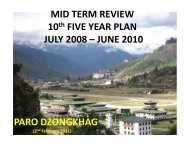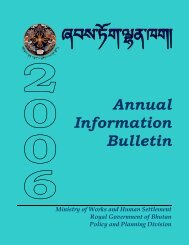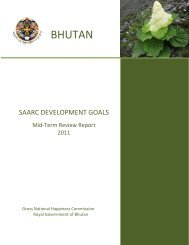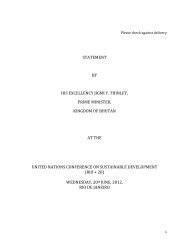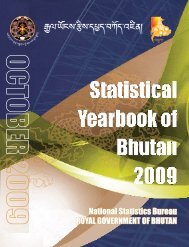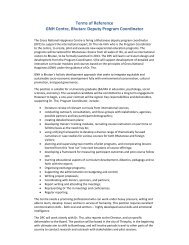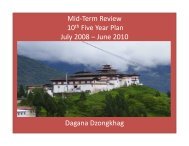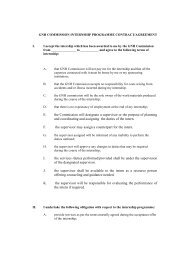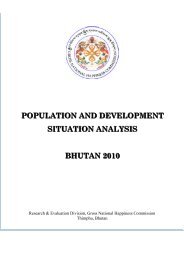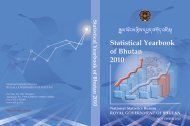COUNTRY BACKGROUND - Gross National Happiness Commission
COUNTRY BACKGROUND - Gross National Happiness Commission
COUNTRY BACKGROUND - Gross National Happiness Commission
Create successful ePaper yourself
Turn your PDF publications into a flip-book with our unique Google optimized e-Paper software.
Renewable Natural Resources<br />
Institutional StrengtheningInstitutional Strengthening<br />
17.55 The strengthening of MOA institutions is viewed as an important requirement for improving the services<br />
provided to the rural population. All sections of the MOA will be strengthened, through training and recruitment of<br />
additional staff. Technical level training of MOA staff will be improved with the opening of the Natural Resources<br />
Training Institute, where staff will receive multi disciplinary training. The MOA will also assist in the development<br />
of private sector, in order to encourage increased private sector involvement in marketing and input supply, and<br />
thereby reduce RGOB involvement in these areas. Communities will also be assisted to develop their project<br />
planning and management skills and will assume greater responsibility in project implementation.<br />
Strengthening of Regional DevelopmentStrengthening of Regional Development<br />
17.56 One of the major lessons learned in the 6FYP was in regard to the implementation of Area Development<br />
Projects as described in Section II.B. During the 7FYP, Regional Development Areas (formerly zones) will be<br />
established and will integrate all ADP activities. This will enable the wider spread of the benefits already gained<br />
from ADP's. Single crop development programmes will be applied to other crops, but implemented within the<br />
regional development programmes.<br />
Integration of Environmental Sustainability into all Agricultural ActivitiesIntegration of Environmental<br />
Sustainability into all Agricultural Activities<br />
17.57 The supply of land for agricultural production is limited, with only small increases in production expected<br />
from development of previously unused land. Thus sustainable development has to be based on sound conservation<br />
practices, land management and land use planning programmes. One of the most important requirements for<br />
sustainable utilisation is the development of land use planning capabilities, to identify and quantify natural<br />
resources, current use and draw up long term plans for all areas of the country. Monitoring of land use should then<br />
become an ongoing activity. Such capabilities will be developed in the 7FYP. Once these land use plans are<br />
available the PPD will work with Regional and Dzongkhag level staff to develop appropriate programmes.<br />
Environmental Impact Assessments will be undertaken for all new projects, with continuous monitoring of the<br />
impact of project implementation. Research and extension activities will also be reoriented to include activities<br />
which ensure the sustainability of agricultural production.<br />
17.58 Rather than restricting agricultural production, particularly tsheri production, the MOA will assist<br />
farmers to integrate new techniques into existing production systems. For example, agroforestry is considered to be<br />
one of the new production systems which would be easily adapted by farmers into existing farming systems.<br />
Farmer's attitudes towards soil conservation, as shown by refined terracing techniques and mulching systems, are<br />
already highly developed. Since the expansion of agricultural land will only be possible by clearing forest areas, it<br />
is important to identify those areas where this would be environmentally viable and where agroforestry would<br />
present a viable alternative to logging. In the livestock subsector, emphasis will be placed on increasing<br />
productivity to raise incomes rather than increasing livestock numbers.<br />
IV. Development Programmes for the 7FYPIV. Development Programmes for the 7FYP<br />
Arable Sector Development ProgrammeArable Sector Development Programme<br />
17.59 As explained in above, support to the arable sub sector will be channelled through Regional and<br />
Dzongkhag level extension staff. In order to achieve the objectives of increasing arable production on a sustainable<br />
basis, it will be necessary to strengthen Regional and Dzongkhag planning and implementation capabilities. The<br />
Central Support programmes will concentrate on the provision of support services to the Regional and Dzongkhag<br />
levels. These will include research, extension, supply of seeds, and planting materials, farm mechanisation,<br />
irrigation and other technical support services.<br />
17.60 The new strategies for the arable sector will be implemented through the Accelerated Food Production<br />
Programme (AFPP) and the Integrated Horticultural Development Programme (IHDP). The AFPP provides the<br />
basis for promoting food self sufficiency through improvements in research and extension capabilities and the<br />
IHDP concentrates on the development of high value cash crops. The AFPP will promote increases in the<br />
productivity of cereal production, as the potential for raising output through increasing area cultivated is limited by<br />
12



